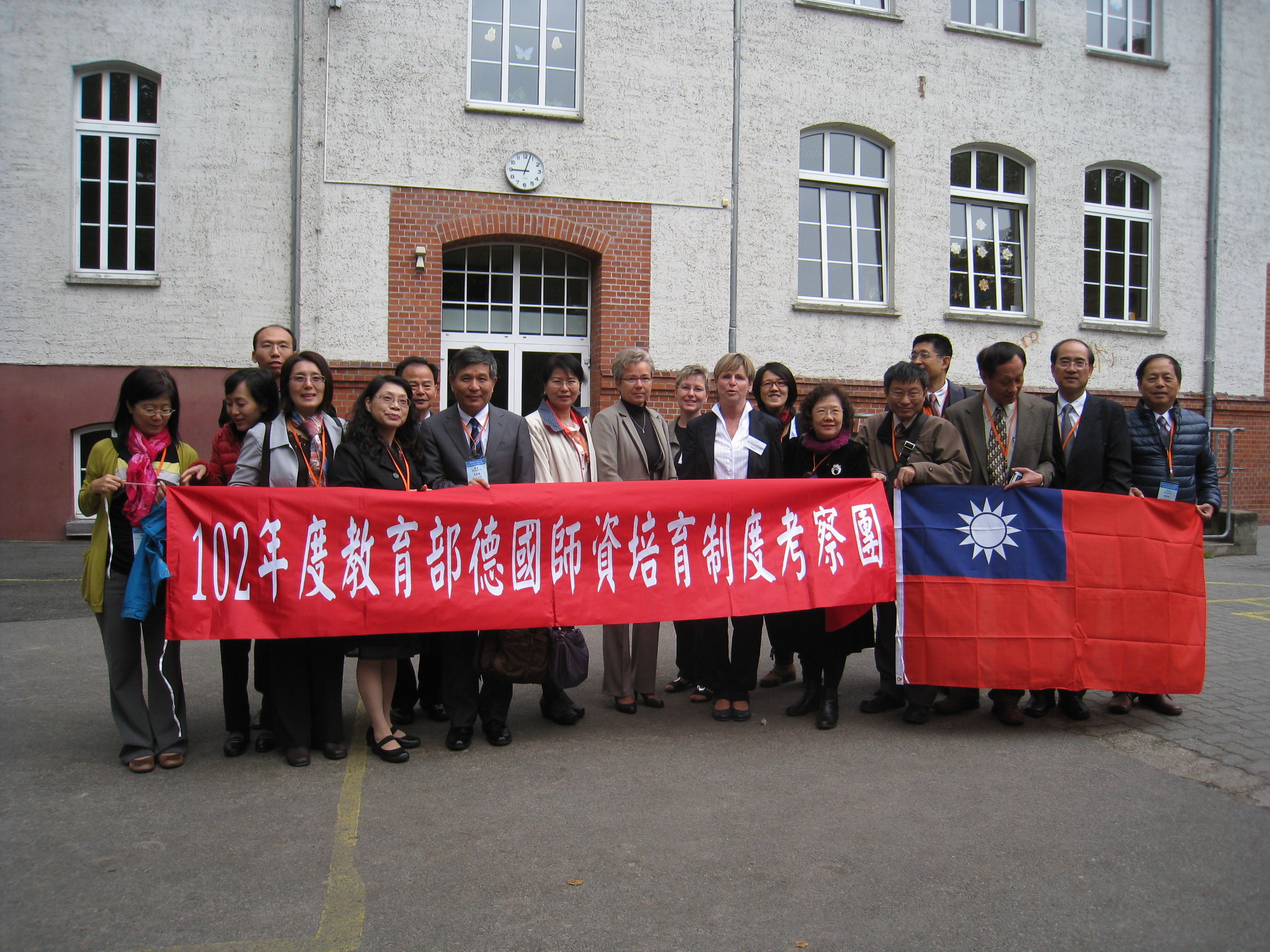2013 MOE Teacher Education in Germany Study Visit – Drawing on Germany’s Experience to Enhance Preschool Education and Elementary School Teachers’ Practical Science Knowledge in Taiwan

While in Berlin, Dr. Chang Shin-Jen, President of National Taipei University of Education (NTUE), Professor Yang Szu-Wei, President of Taichung University of Education (NTCU), and Professor Lee Hsien-Che, President of Pingtung University of Education (NPUE) met with Dr Theda Borde, President of Alice Salomon University of Applied Sciences (ASH), following up earlier positive discussions, and invitations to engage in academic and educational exchanges.
The preschool teacher education program at this old university has features which are closely allied to current development trends in this education sector in Taiwan, and based on this important factor, on September 11, each of these three education universities signed an MOU with Alice Salomon University of Applied Sciences. These will strengthen mutual student exchanges, exchange visits of teachers and students, and cooperative academic research activities. This marks the beginning of a new era for teacher education exchanges between Germany and Taiwan.
This German university founded in 1899, more than a century ago, is famous for its social work education. In recent years, it has given great importance to focusing on practical hands-on activities, experiential science, and linguistic and artistic creativity in its preschool teacher education. It has set up a research laboratory where children can do ‘hands-on’ science as a teaching tool for its own trainee teachers. The lab signs all say “Please touch” instead of the “Do not touch” normally seen in laboratories in the past. The new signs are designed to encourage children to actively explore and learn, and this approach has been enthusiastically welcomed by children and parents alike.
NTUE President Chang commented that Alice Salomon University of Applied Sciences is incorporating the ideas of the German educationalist Fröbel—(1782–1852) best known for his work on kindergardens and play—to develop science education for young children, and that Taiwan can valuably draw on its experience. NTCU President Yang pointed out that the educational system in Germany which has developed over a long period of time emphasizes that science education must take root in early childhood education, and this is a striking example of how people’s knowledge and understanding of science is developed.
NPUE President Lee expressed strong willingness to draw on this German university’s experiences and research into young children’s hands-on science learning. He proposed actively furthering young children’s hands-on science education in Taiwan and Germany by providing communities with learning resources, and linking the communities with professional training and development colleges and universities. Trainee teachers would be able to do internships and teachers would be able to do in-service professional development training in associated community settings.
MOE Deputy Director-general Kuo Shu-Fang commended the university presidents for energetically exploring such key opportunities to develop their universities through international exchanges, and thereby provide their students with more diversified learning experiences, and extend their global outlook. Alice Salomon University of Applied Sciences places a great deal of importance to daily life topics, “hands-on” learning, and experiential science in young children’s education in its teacher education and training. This student-centered student-oriented approach to learning places great importance on experiential education: this helps develop students’ potential based on their interests and desire to learn. This approach is fully in keeping with the spirit of Taiwan’s 12-year basic education program, and this education model is suitable for actively incorporating into the education and training of elementary school teachers.
NPUE President Lee has also agreed to establish a “hands-on science” center at Pingtung University of Education based on developments in science education in Taiwan. This will support extensive education research advancing Taiwan’s preschool education and practical science education in elementary schools, and also serve as a promotional base. It will advance both teacher education and training, and working teachers’ knowledge and skills of practical science as part of their continuing professional development (CPD).
If the new approach being set up by these three universities is successful, the MOE will promote their experience and strategies for use in other universities offering teacher education programs. Developing and enhancing preschool and elementary school teachers’ own hands-on skills is an important direction for the education of trainee teachers and teachers’ CPD to take: they will then be able to pass these onto the children in schools.
Photos :
16 MOE representatives and professors from Taiwan visited Hegermühlen Elementary School in Brandenburg State and observed teaching and learning inside classrooms. The group wanted to learn about the school’s operation, its mathematics-integrated-into-art education, inclusive education, after-school care courses, students’ learning motivation, and the dedicated efforts teachers put into teaching. The MOE delegation was impressed by Germany’s elementary education, and people from both countries engaged in excellent fruitful discussions.
The study group entered classrooms and observed the diverse range of inclusive education measures adopted to cater to student differences. These include: cooperative learning in groups, differentiated instruction, mixed-age classes and ‘vertical’ teaching, assigning different learning tasks to different students based on a suitable level of difficulty, and curriculum design and learning assessment satisfactorily taking into account individual students’ different requirements. As well as this, the students are taught effective learning strategies.
